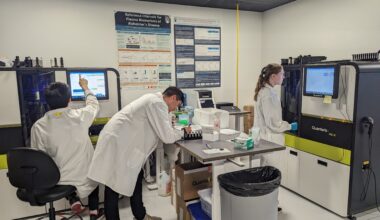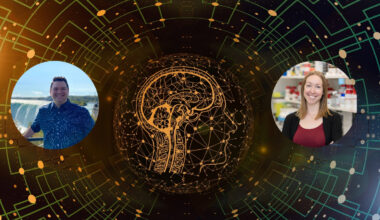Jenna Smith-Forrester came to UBC to forge her own path, and by combining her passion for neurology and her collaborative approach to research, she has done just that.
Jenna came to UBC in 2013 as a Master’s student in the Graduate Program in Neuroscience, supervised by Dr. Jon Stoessl. Based in the Djavad Mowafaghian Centre for Brain Health, she worked on acquiring a new tau-specific radioligand (11C-PBB3) for position emission tomography (PET), and establishing the tracer’s baseline data.
Her work will improve our understanding of the role of tau, a protein that’s important to the proper functioning of the brain and central nervous system. When misfolded, tau is known to form insoluble aggregates that deposit inside neurons, and contribute to neurological conditions such as Alzheimer’s disease, Progressive Supranuclear Palsy and Chronic Traumatic Encephalopathy. Prior to enrolling at UBC, Jenna earned her BSc with Distinction at Dalhousie University, and worked as a research scholar at the Robert and Arlene Kogod Center on Aging at the Mayo Clinic in Rochester, Minnesota.
Her thesis, titled “Structural and Functional Imaging of Tauopathies,” was the result of multidisciplinary collaboration and pooled expertise; for the elements of her work related to PET, she worked closely with Pacific Parkinson’s Research Centre, UBC’s Nuclear Medicine Department, the MRI Research Centre, and TRIUMF. For those elements tied to sports-related concussion, she worked with Dr. Naznin Virji-Babul in the Perception Action Lab at DMCBH and the School of Computing Science at Simon Fraser University.
Jenna started the MD program at UBC in August, and as part of the cohort in the Northern Medical Program, will be relocating to Prince George in January. “While I have enjoyed my experiences in both bench-based and clinical research, I am motivated to think on a much grander scale that encompasses population health,” she says, looking forward. As a physician, Jenna is excited to bring her expertise and enthusiasm to advocating for quality improvement initiatives across the spectrum of care delivery.
“I have a very personal connection to neurodegenerative disorders and thus great motivation for pursuing a career in neurology. Now more than ever, it’s about identifying innovative, team-based approaches to providing specialist services in rural areas, and I’m excited to be a part of this movement!”
“Ultimately, I hope to help unleash the potential in students in healthcare-related programs to serve as change agents. Together we can usher in an era of unparalleled service delivery, while reducing errors, waste, and cost,” she says. “One day I will find my niche, or perhaps I shall create it.”


